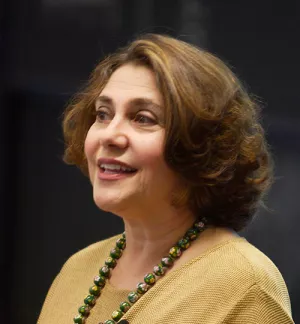On Sept. 11, 2001, I joined thousands of New Yorkers as they walked uptown along Park Avenue. It must have been one or two o'clock in the afternoon when suddenly two fighter jets roared through the airspace above the center of Manhattan.
We all stopped walking and gazed up at the sky. Tears came into people's eyes. Everyone turned to each other saying things like: "Thank God, they're here."
But even as we stared at them in awe I remember thinking: Those jets were helpless against this enemy. They didn't deter them and didn't intercept them. Four years later, Osama bin Laden still is on the loose and terrorists still are striking — in Bali, Madrid and London, among other places.
When all you have is a hammer, everything looks like a nail. Or so the saying goes. In the aftermath of the second London terrorist attacks in two weeks, the American-led and British-supported response to terrorism is looking very much like a hammer.
At some point we have to come to grips with the fact that precision guided weapons, F-18 fighter planes, stealth bombers and the educated, tough men and women who wield these sophisticated weapons are like the hammers that fool us into making terrorism look like a nail. We're supposed to be fighting terrorists in Iraq so we don't have to fight them on our own soil. Go tell that to a Londoner stuck in a blown-up subway.
Now is the time to stop and ask: If the greatest military force in history can't stop terror, who can? Well, how about two women you've probably never heard of — Aida Farsical and Diana Dean?
Farsical is a Philippine policewoman. One night in 1995 a fire alarm went off in Manila. Farsical was on duty at Police Station No. 9. She sent a patrolman to check it out, and he came back saying there was nothing unusual — just some Pakistanis playing with firecrackers. But Farsical's intuition told her that this was anything but routine and so she went to see for herself.
The end of the story is that Farsical wound up disrupting the infamous Bojinka plot — a terrorist plan that, had it gone forward, would have resulted in fatal explosions aboard 11 long-haul airline flights between the United States and Asia.
Diana Dean is a customs agent on the Port Angeles border crossing between Canada and the United States. On Dec. 16, 1999, she stopped Ahmed Ressam, an Algerian-born Canadian who was driving a rented Chrysler aboard a ferry from Victoria, British Columbia. Like Farsical, Dean had a hunch that all was not well. Ressam was "acting nervous" when she asked him routine questions. So she called over a colleague who opened his trunk and found everything anyone would need to build large-scale explosives.
Dean and her colleagues interrupted the "Millennium plot," an al-Qaida inspiration that would have blown up much of Los Angeles International Airport.
Terrorism is not a law-enforcement problem. It is much more serious than a numbers racket in the South Bronx. But so far the record is clear. Smart cops stop terrorists, smart weapons don't. Maybe the front lines of the war on terror should be the precinct houses of every big city in the Western world.
We should spend more money and more time making the average experienced cop on the beat part of our war on terror. We need undercover cops who can infiltrate local Islamic organizations and immigrant communities; we need more cameras in public places and more people trained to spot terror before it happens. We need police we can trust with classified information, and we need the local knowledge that only a beat cop has to make its way to the organizations whose sole purpose is fighting terror.
For almost four years now, government leaders have moved around boxes on those organization charts and created new jobs — in Washington. How about some new jobs in the subways and on the borders?
Elaine Kamarck is a lecturer at Harvard University's Kennedy School.
Kamarck, Elaine. “Best Defense against Terror is the Cop on the Beat.” Newsday, July 22, 2005





